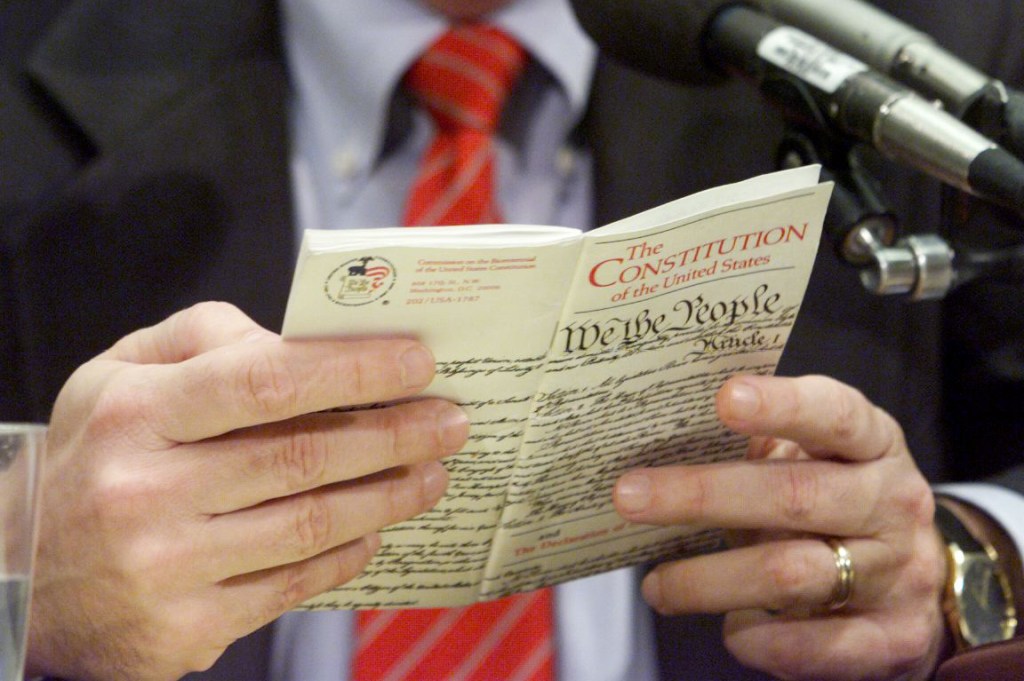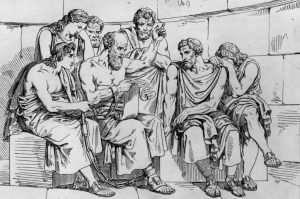Laramie, Wyoming
Christopher Caldwell, the ubiquitous globetrotting journalist, has discovered the existence, hitherto undiscerned, of a second United States Constitution, the Constitution of 1964. The First Constitution, Caldwell argues, is the one familiar to us all, written in 1787 and ratified the following year. This document he calls the Constitution of Liberty. The second is the Constitution of Equality. His claim, valid so far as it goes, remains nevertheless incomplete; Mr Caldwell having overlooked the Third Constitution that, like the British constitution, is an unwritten one, the product of an already vast accretion of law and precedent (99 percent of it dishonest and meretricious buncombe) developed, mainly, since 1945. This is the Psychotherapeutic Constitution that, like the Constitution of Equality, has vastly expanded the powers and reach of the Constitution of Liberty by endowing it and the political class that interprets and applies it with a phantasmagoric Fourth Dimension in which to amuse and disport themselves.
The breakthrough to this dimension gave the American politicos and their bureaucratic factotums their greatest leg-up since Roosevelt discovered during the Hundred Days that the Constitution of Liberty de facto grants to the Chief Executive of the Republic and his administrative minions the power to do virtually whatever they please; or since the Supreme Court Justices in 1965 discerned in Griswold v. Connecticut the existence of invisible ‘penumbras’ and ‘emanations’ that permit the Court to decide every case almost in any way it likes, provided only that it is sufficiently imaginative and intellectually irresponsible in arguing its case. The Psychotherapeutic Constitution revealed to liberal politicians a wholly new alternative, or shadow, landscape, similar to the subterranean ones that underlie the seas and oceans and the gaseous cloudscapes that double the earthy topography below, thus empowering governments to legislate for the benefit of the public’s imagined psychic and emotional health as well as in the interests of its physical wellbeing, its material prosperity and its security as a people and as a nation. For them, the claim is justified by the longstanding liberal conviction that issues of human mental and emotional health are as objectively real, identifiable and treatable as physical illnesses and disorders, and the psychological and psychiatric professions as solidly grounded in scientific certainty, intellectual honesty, seriousness and probity as the medical one is. The result over the past few decades has been the opening of a vast New Frontier to activist liberal government, liberal law and liberal bureaucracy in Washington, DC and every one of the 50 states. So far as the field of popular psychology and its practitioners have been accepted as being everything they say they are, the law has been debauched and trivialized, the national character weakened and individual and public neuroses indulged for the avowed purpose of preventing and curing afflictions of the psyche.
The Constitution of 1787 reflects pretty accurately the ideas of the wider American public of the period as they were clarified and given shape, coherence and expression by representatives of colonial America’s aristocracy. That of 1964 was a top-down affair reflecting the consensus of the liberal nouveau-intellectual elite, imposed by a Congressional majority upon the citizenry of half a hundred states. In this respect the Third Constitution is a blend of its predecessors, its principal ideas having been developed by intellectuals, academics and members of the psychological and psychiatric professions, who subsequently succeeded in convincing their liberal associates in the other learned professions and in politics of a crying public need to have their speculative theories validated by government and incorporated into the accepted basis of modern liberal lawmaking. Once that goal had been accomplished, the aims and methods of the Psychotherapeutic Constitution merged effortlessly and thus almost unnoticed with those of the Constitution of Equality, as liberal politicians and activists recognized sexual deviants and other groups whose mental and emotional makeup differ from the majority in ways it disapproves, by inventing for them a new category of victimhood and recognizing their moral equivalence with racial majorities already protected by the Civil Rights Act. It is a cherished axiom of the psychological class that the human psyche is an almost infinitely sensitive and delicate thing, incapable of healing itself, and so vulnerable to irreparable damage by acts of exclusion, signs of disapproval and other types of perceived maltreatment, however small and whether intended or not by the brutish majority; hence the present liberal crusade against ‘hurtful behaviors’, supported by liberal lawmakers, school superintendents and the media to shield relatively abnormal minorities against psychic abuse by the more or less normal majority. The hoary English saying that ‘Sticks and stones may break my bones, but words can never hurt me’ is never heard nowadays in the mouths of parents, schoolteachers or anyone else in contemporary society. President Trump, who throws all the sticks and stones he finds to hand, alone acts as if he had not forgotten this bit of childish doggerel, while demonstrating wherever he goes that he is what his critics call (others, never him) ‘the only adult in the room’ by taking as good as he gets and never complaining about the thousand and one brickbats and dead cats hurled his way every day. Trump’s immunity to hurt, indeed, makes him an ideal subject for some research professor’s investigation into the fundamental strength and stability of the healthy adult psyche; though, so far as I know, no researcher has yet been awarded a fat academic grant to pursue such a project.
The success the ‘transgender’ movement is having in bending politics, the law and human sympathy toward the public acceptance of the wholly unnatural and consequently immoral ‘rights’ it claims for itself on penalty of enormous fines and absurdly long jail terms levied against dissenters from the new liberal orthodoxy is only the most obvious demonstration of the influence the Psychotherapeutic Constitution has come to exercise over and above the power of the Constitution of Liberty. Another is the determination government, law and the bureaucracy have shown in thrusting themselves into personal disputes between adults of a sort that formerly were resolved by the parties themselves, mostly without resort even to private litigation. Such disputes include the mainly unwitnessed and uncorroborated sexual contacts from which the #MeToo movement arose: encounters of the kind that in saner days would have ended in the male party’s receiving a vigorous kick in the tender parts and the female one dusting off her hands and marching away with her chin in the air, while remarking, sotto voce, ‘Some men just won’t be told!’
No actress, however beautiful and talented she may be, has a legal or moral right to a choice role on-screen or onstage, whatever the Psychological Constitution has to say about the matter. The Constitution of Liberty, for its part, would advise the offended lady to seek a career in a field more respectful than show business of the honorable claims of female virtue.
This article is in The Spectator’s May 2020 US edition.


















